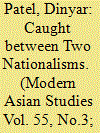| Srl | Item |
| 1 |
ID:
179908


|
|
|
|
|
| Summary/Abstract |
In 1922, a group of wealthy Parsis in Bombay founded an organization that they dubbed the Iran League. Originally designed to assist their fellow Zoroastrians in Iran, who had suffered from centuries of oppression, the League quickly expanded its objectives to include the promotion of broader Indo-Iranian cultural and economic relations. It became a major player in the flow of ideas, literature, business, and tourist traffic between the two countries. Parsi fervour for Iran stemmed from the brand of Iranian nationalism promoted by Reza Shah, which celebrated the country's Zoroastrian past. In response, the League's leaders argued that the Parsis of India could play a special role in the ‘regeneration’ of Iran under the shah's supposedly benign rule. By the 1930s, however, Parsis’ embrace of Iranian nationalism became a clear reflection of their deep concerns about Indian nationalist politics: they cast Iran as an idealized alternative to contemporary India, where the Indian National Congress had supposedly taken an ominously ‘anti-Parsi’ turn. The Iran League, therefore, was caught between two nationalisms. Worry about India's future even prompted some Parsis to argue that their community should ‘return’ to their ancestral homeland of Iran. The story of the Iran League thus demonstrates the complex position of minorities vis-à-vis the brands of nationalism in development during the interwar years. The Parsis, a wealthy but microscopic minority, responded to political anxieties at home by romanticizing a foreign country and taking part in a wholly foreign nationalist project.
|
|
|
|
|
|
|
|
|
|
|
|
|
|
|
|
| 2 |
ID:
155371


|
|
|
|
|
| Summary/Abstract |
With point of departure in the emic concept of ‘two feet,’ the article explores how transnationalism by ‘keeping a foot in the door’ is being practiced among people of Indian origin living in Tanzania. Indians settled in East Africa in the late nineteenth century and since the end of colonial rule they have been aware of distributing different citizenships within the families in order to stay transnationally mobile after independence. Numerous Indians moved to the U.K. and Canada in the years following independence and those who stayed back made sure to ‘keep the door open’ and thus secure a potential future abroad. ‘Two feet,’ the article argues, is a practice that ensures a necessary level of social protection for the East African Indians. Shedding light on ways in which lifeworlds stretched across national borders unfold on a micro level, the article shows how ‘two feet’ is a gendered practice in which women’s purity becomes intertwined with transnational mobility and the potentiality of different places.
|
|
|
|
|
|
|
|
|
|
|
|
|
|
|
|